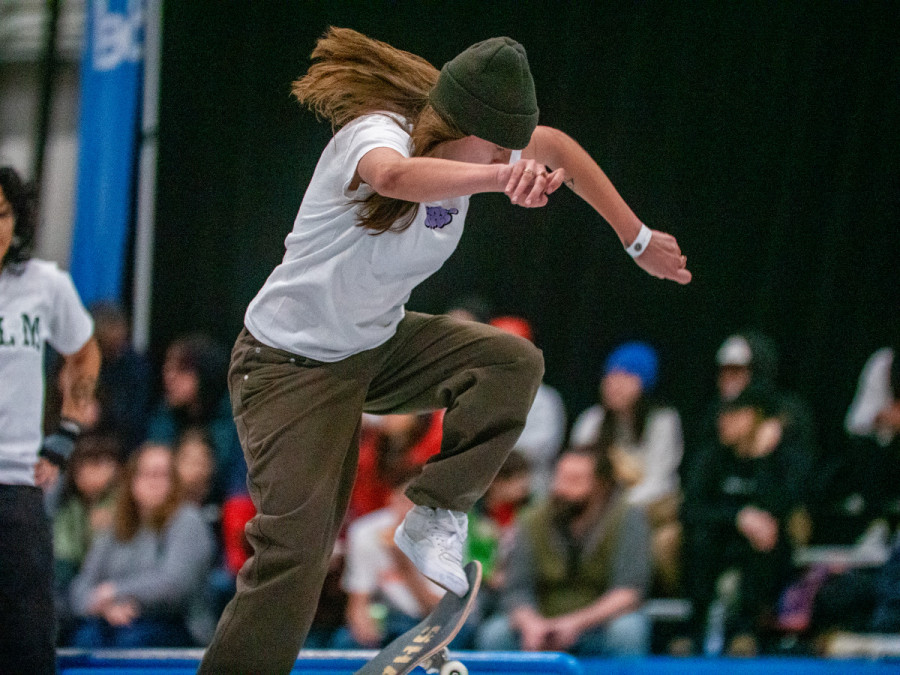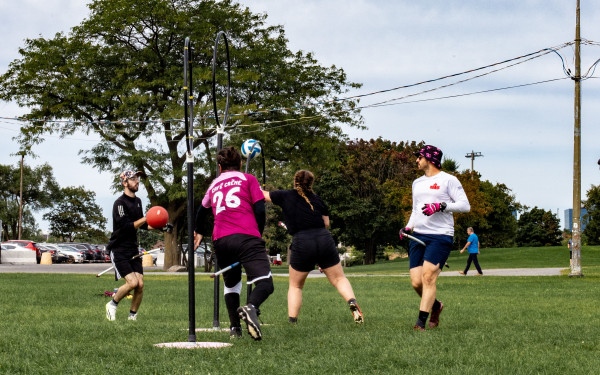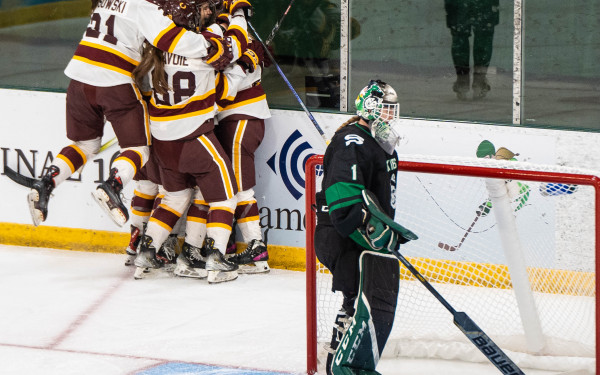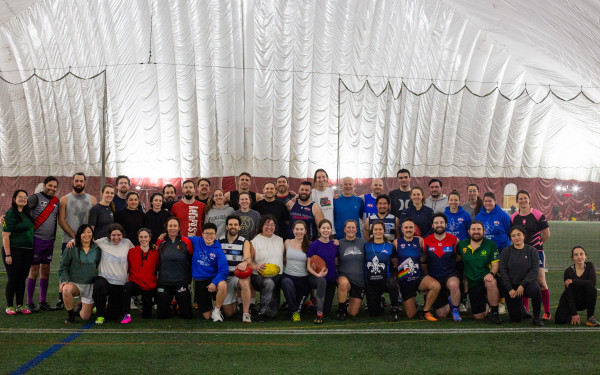Montreal leading the way in Canadian skateboarding
A vibrant culture comes through the city’s parks and inclusive initiatives
When thinking of sports in Montreal, there are a plethora of disciplines that come to mind: hockey, football, soccer, baseball, perhaps even tennis and lacrosse.
But one back-burner sport deserves more heat on the city stove of athletics and recreation. A sport that recently gained entry into the Olympics, and has many Montreal natives pushing it forward. A sport that merely requires a piece of wood, four wheels, and a can-do attitude.
The city’s years-long journey to the forefront of the Canadian skateboarding landscape has included the construction of several skate parks, the creation of community groups and countless initiatives geared toward diversity and inclusion. Montreal’s Le Taz Skatepark was also the lucky host of the 2024 Canadian National Street Skateboard Championships on Feb. 21-22.
Canada Skateboard is the federal body overseeing skateboarding in Canada. Director of High Performance Adam Higgins expressed his love for Montreal’s skating culture and asserted the city’s merit as hosts of the championships. “It's what Montreal means to skateboarding in Canada and that's why we're here,” he said. “It's an amazing scene and we love it.”
The Greater Montreal Area’s high-quality indoor facilities, like Le Taz in Ahuntsic-Cartierville and Spin in Brossard, set it apart from other Canadian cities. There are also many outdoor parks to offer in Verdun, Lasalle, Lachine, the Mile End and the Plateau.
For many at the Canadian championships, it was far from their first time experiencing the skate scene in Quebec’s largest city.
“We used to have probably two or three contests a year here when I was growing up,” said Burnaby, B.C. native Micky Papa, who represented Canada at the Tokyo 2020 Olympics. “I might have skated in Montreal more times than any other place in the world.”
The ones who have grown up in and around Montreal have a special connection to its parks and community groups, and they have also seen its skate culture evolve to become more inclusive over time.
“I started skateboarding in 2000,” said Canada Skateboard President and Montreal-born Annie Guglia. “At the time, if I saw another girl with a skateboard in Montreal, I would get off the bus and be like, ‘Who are you? Where do you skate?’”
Guglia—winner of three consecutive Canadian Championships from 2018 to 2020—competed in three world championships in 2018, 2019 and 2021. She became the first woman to represent Canada at the Olympics, placing 19th in the street skateboarding event at the sport’s inaugural appearance in Tokyo.
She says that one of the biggest obstacles in her career was the lack of role models as she was growing up. Pre-social media, the only way she could come across athletes was by seeing them covered in the media. But at the time, mainstream outlets rarely covered women’s sports, and certainly not women’s skateboarding.
“It’s hard to be what you can’t see, right?” Guglia said.
She began skating when she was ten years old. In 2002, she helped create the Skirtboarders, a community group in Montreal for women and girls interested in skateboarding. The group had only 13 women at the time.
“Now, it’s not rare to see 13 girls at the skate park at the same time,” she said.
The creation of inclusive community groups specifically for women and girls has been a driving force behind the transformation. One group, Planche Collective, was founded in 2021 as a safe space not only for women in Montreal, but also for skaters from BIPOC and LGBTQIA2S+ communities. The group, co-organized by Marie Anne Louis-Charles, hosts inclusive skateboard sessions at l’École secondaire Jeanne-Mance’s JM Court Skatepark from 6 to 9 p.m. on Mondays.
But groups like Planche Collective are not meant to be the lone safe haven for under-represented skaters. They are intended as stepping stones for queer skaters.
“People think that it’s their only space in skateboarding. But I would say not at all,” said Guglia, who is also an open LGBTQIA2S+ activist. “The goal of those spaces is to create a space where people feel safe, empowered and build confidence to meet people that look like them,” she said. The end goal of these community groups is for skaters “to go to the skate park by themselves, keep skating and probably inspire other people to do the same thing.”
At the national level, Canada Skateboard has also been heavily involved in making the sport more inclusive. An organization within Canada Skateboard, SheCANSk8, is specifically designated toward promoting accessibility to skateboarding for women. There are currently 34 community groups officially registered under SheCANSk8, such as the Skirtboarders, and Les Vagabonnes, of which Guglia is also a member.
Guglia and Louis-Charles took part in a SheCANSk8 panel discussion at the Canadian championships. Also included in the panel was Montreal-born Samantha Secours, an up-and-coming skateboarder. She greatly admires Guglia, who has taken Secours under her wing, and Secours cannot help but admire the steps that Guglia has taken to open up the sport to anybody and everybody.
“Annie has been a pioneer in that way,” Secours said, adding that Guglia helped her feel comfortable in skateboarding by inviting her to events hosted by Les Vagabonnes. “The first time I skated with girls was during these events, so it was really nice,” she said.
Aside from Secours, many also look up to Guglia. Papa, a skateboarding veteran who has known Guglia for a long time, has high praise for her, and believes that she is the perfect fit to lead Canada’s national skateboarding organization.
“I couldn’t imagine a better role for her because she’s been on both sides of things. She knows the frustrations of the athletes, she knows the frustrations of the administration, and she can blend the worlds seamlessly and also be a point of trust for everyone,” he said. “Talk about diversity, inclusion, and the things she’s accomplished. I mean, no-brainer, look up to Annie.”
As for Guglia, she feels that the sport’s entry into the Olympics is a big reason behind its transformation towards inclusivity. All tournaments surrounding the Olympics give equal exposure to men and women, and she thinks the mere visibility of women on skateboards—which she did not have as a child—does a lot of the heavy lifting.
Nevertheless, Guglia still realizes the influence she has on the sport in Montreal, nationally and worldwide.
“I’m starting to realize the real impact that you can have on a person’s life by just being yourself and just being visible,” she said. Many parents have approached her in skate parks to tell her that seeing her on TV inspired their daughters to pick up a board. “If there’s more girls that see me and they’re like ‘Oh that looks fun. I want to try that,’ then I’ve done my job.”
This article originally appeared in Volume 44, Issue 11, published March 5, 2024.







